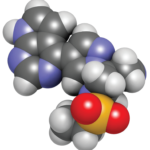ACR Convergence 2021—The recent Boxed Warning requirement applied to three Janus kinase (JAK) inhibitors, cautioning doctors and patients about several major risks in patients with rheumatoid arthritis, came only after rigorous data collection and careful consideration of the risks and the benefits, U.S. Food & Drug Administration (FDA) officials said in November at ACR Convergence 2021.
In a session updating the audience on a variety of areas overseen by the FDA, many attendee questions had to do with the decision earlier this year to issue a Boxed Warning for the whole class of JAK inhibitors approved for rheumatic conditions: tofacitinib, baricitinib and upadacitinib. The warning is related to major heart events, malignancy, blood clots and mortality. The data, the officials said, also warranted limiting the indications: These drugs must only be used for patients with an inadequate response or intolerance to one or more tumor necrosis factor (TNF) inhibitors.
The warnings, the most prominent issued by the FDA, came after a post-marketing research safety study on tofacitinib revealed safety concerns.1 Tofacitinib was found to bring a 33% higher risk of major adverse cardiovascular events and a 48% increased risk of malignancy (except for non-melanoma skin cancers) compared with TNF inhibitors, the research found.
A major question: What was the rationale for extending the warning to the other two drugs, too?
“Yes, they are all JAK inhibitors, but they are different JAKs, and really, is it fair to cover them all with a significant class-effect warning?” one attendee asked.

Dr. Rajpal
“Given the seriousness of these safety concerns,” said Anil Rajpal, MD, MPH, medical team leader in the rheumatology and transplant medicine division at the FDA, “and the cumulative knowledge about the dose- and exposure-dependent toxicities, we considered that these findings are relevant to baricitinib and upadacitinib—in other words, to be class effects for the products for the treatment of inflammatory conditions.”

Dr. Nikolov
Nikolay Nikolov, MD, director of the rheumatology and transplant medicine division at the FDA, said the rigorous nature of the data dictated the broader warning. “We certainly recognize the importance of tofacitinib and all the JAK inhibitors in the management of inflammatory conditions,” he said. “However, we also recognize that we now have the safety data, which are derived from a prospective, randomized controlled study that was specifically designed and conducted to compare the safety of tofacitinib to that of TNF inhibitors. And the data are compelling and robust to support the meaningful comparisons of adverse events of special interest.”
Another attendee asked about baricitinib’s approval for COVID-19 use, given the safety concerns. “It was approved for emergency use in COVID, and yet we now have an added risk for thrombosis across the class,” the questioner said. “This seems to be inconsistent and contradictory.”

Dr. Golding
Amit Golding, MD, PhD, a medical officer in the rheumatology and transplant medicine division, said the reasoning had to do with the duration of treatment. “We recognize the concern,” he said. “The updated safety information on JAK inhibitors refers to risk accrued over years, whereas the baricitinib emergency use authorization for treatment during COVID is limited to 14 days.”
A post-marketing safety study is required for baricitinib (to be completed by October 2026), but no such study was required of upadacitinib when it was approved, the FDA officials said.
In the end, Dr. Rajpal said, the FDA has had to weigh all the benefits and risks in the face of limited data for the other two medications. “All of these products share a similar mechanism of action,” he said. “In the absence of a good understanding of which targets are associated with specific risks, it is difficult to determine the relevance for specific safety outcomes. Also, none of the other JAK inhibitors has the extent or the rigor of the randomized controlled trial data to reliably rule out the risks identified in ORAL Surveillance,” the post-marketing study.
Avacopan Approval
Nadia Habal, MD, a clinical reviewer in the FDA’s rheumatology and transplant medicine division, reviewed the FDA’s rationale in another approval that has generated interest: avacopan, a complement 5a receptor antagonist approved in October for ANCA-associated vasculitis when used with standard therapy.2 The drug was approved after a review committee chose to support approval for the drug by a slim margin, 10 votes to 8, and with the caveat that the drug doesn’t eliminate the need for systemic glucocorticoids.

Dr. Habal
Dr. Habal said complexities in the trial’s design made it a challenge to interpret the data. The primary endpoint of remission at 52 weeks was met, but superiority for the drug was not shown at 26 weeks compared with prednisone, a period during which 86% of the avacopan-treated patients received a non-study supply of glucocorticoids.
The committee ultimately decided the safety profile and the risk-benefit profile was adequate, Dr. Habal said. “The division also considered the clinical circumstances where additional flexibility may be warranted with respect to the acceptability of uncertainties,” she said. “ANCA-associated vasculitis is a rare and serious disease associated with high morbidity and mortality, for which an unmet medical need remains.”
Thomas Collins is a freelance medical writer based in Florida.
References
- Safety study of tofacitinib versus tumor necrosis factor (TNF) inhibitor in subjects with rheumatoid arthritis. Pfizer. 2021 Aug 17. https://clinicaltrials.gov/ct2/show/study/NCT02092467.
- Jayne DRW, Merkel PA, Schall TJ, et al. Avacopan for the treatment of ANCA-associated vasculitis. N Engl J Med. 2021 Feb 18;384(7):599–609.



